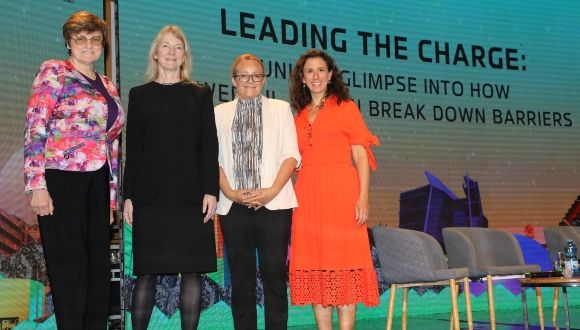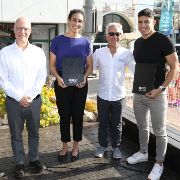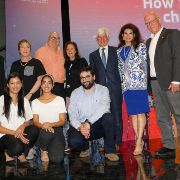BOG 2022: Exposing Hidden Truths from the Female Perspective
Jodi Kantor, Pulitzer Prize winning journalist; Prof. Katalin Karikó, co-creator of mRNA-based COVID-19 vaccines; and Prof. Cornelia Bargmann, prominent neurobiologist and geneticist, offered a glimpse into their exceptional lives in a lively discussion.
“You’ve made your way through smoke-filled editorial rooms and the exclusive world of elite science—both predominantly male fields,” said Prof. Milette Shamir, TAU Vice President International, who moderated the event titled, “Leading the Charge: A Unique Glimpse into How Powerful Women Break Down Barriers.” All three panelists received TAU Honorary Doctorates at this year’s Board of Governors meeting.
Although the women come from different backgrounds, their life stories are strikingly similar. All found mentorship, support, and the belief in truth to be essential factors in propelling their success in leading change.
Bargmann described coming from a “highly academic household. At our home, the values of education, constant sense of discovery, curiosity and love of learning were highly encouraged,” she said.
As the granddaughter of Holocaust survivors, Kantor grew up “surrounded by the atmosphere of investigative journalism,” an environment filled with questions about her grandparents’ past.
“Science and investigative journalism share the spirit of open-minded inquiry,” said Kantor, who broke the Harvey Weinstein sexual assault story in the New York Times, spurring the world-changing #MeToo movement. A love of knowledge and a readiness to receive the unexpected connect the two, she added.
Karikó grew up in a small town in communist Hungary and was the first member of her family to attend high school. “I was surrounded by loving parents and by very good teachers, who believed in me,” she said. From an early age, she was curious about the animals and nature that surrounded her. Upon being fired from a Hungarian university for being too scientifically daring, Karikó and her family immigrated to the United States, with $900 hidden in their daughter’s teddy bear—because they were not allowed to take such a sum out of the country.
The panelists reflected on obstacles they encountered and highlighted the factors that could help other women following in their footsteps. “Limits can also be turned into opportunities,” said Bargmann. “People believed in me, not just women but men. In a [situation] of underrepresentation, it’s the responsibility of everyone to reach out and extend a helping hand.”
Karikó reflected on society and government’s responsibility to support women and underrepresented groups. “Affordable, high-quality childcare was essential in allowing me to continue my work… Also government programs that reach out to underrepresented populations and give them real examples of what higher education is all about are essential.”
Toward the end of the panel, Kantor gave a broader perspective: “Gender is not just a topic, but an entry-point into a different narrative than the one we are used to seeing,” she said. She added that there were powerful players who tried to prevent her story about sexual abuse in the film industry from being published. “But they were no match for the truth and for the brave women who told their stories. We can’t solve a problem we can’t see. We have to expose the hidden truth in order to change it,” she concluded.






